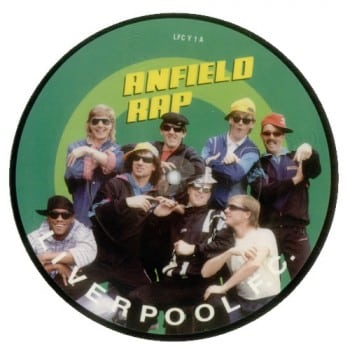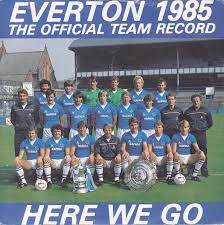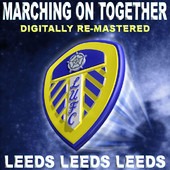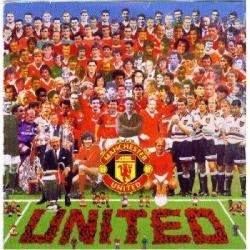Soccer clubs and players love releasing pop records. But which EPL team has dominated the pop charts through the decades? Jon Langford hosts the chart countdown. When football goes pop!

Which EPL Team Is Top Of The Pops?
Even the most casual football fan could tell you which teams have spent the most time at the top of the EPL, but could they tell you which club has dominated the pop charts through the decades? Most likely not, as it’s fairly pointless information. Here’s the rundown:
By Jon Langford
Everton

Position: 7th
Songs: ‘Here We Go’
‘All Together Now’
Combined Weeks on Chart: 8
Peak Position: 14 (‘Here We Go’)
Recorded at Abbey Road Studios and promoted with a mullet-heavy performance on Wogan, ‘Here We Go’ was Everton’s 1985 FA Cup Final anthem. The Merseyside club had already won the league and Cup Winners’ Cup. They went into the FA Cup final against Manchester United as favourites to record an historic treble. Manager Howard Kendall put the 1-0 defeat down to ‘musical differences.’
A decade after the release of ‘Here We Go’ The Toffeemen reworked a version of The Farm’s hit single ‘All Together Now’ for their 1995 FA Cup Final appearance. Unfortunately this effort didn’t fare as well in the charts as its predecessor, reaching only number 24. However, the good news for the blue half of Merseyside was that this time they beat Manchester United 1-0 thanks to a Paul Rideout header.
Leeds United
Position: 6th
Songs:
‘Leeds United’
‘Leeds Leeds Leeds’
Combined Weeks on Chart: 14
Peak Position: 10 (‘Leeds United’ and ‘Leeds Leeds Leeds!’)
In 1972 Leeds United hired the songwriting team behind the Tom Jones hit ‘Delilah’ to compose an original song for their trip to Wembley where they would face Arsenal in an ultimately successful attempt to win their first FA Cup. Although the eponymous song charted at number 10, it would be the B-Side ‘Leeds Leeds Leeds’ better known as ‘Marching On Together’ that was destined to become the club’s anthem. After the Elland Road outfit won promotion back to the Championship in 2010 the club digitally re-mastered and re-released the song. Subsequently, thanks to some Radio One spins from Leeds fan Chris Moyles, it eventually peaked at number 10.
Arsenal FC
Position: 5th
Songs: ‘Good Old Arsenal’
‘Shouting for the Gunners’
‘Hot Stuff’ ‘Arsenal Number One’ / ‘Our Goal’
Combined Weeks on Chart: 16
Peak Position: 9 (Hot Stuff)
“If it were possible to arrest those responsible for crimes against music then the people behind Arsenal’s 1998 butchering of Donna Summer’s ‘Hot Stuff’ would currently be serving a life sentence.”
Inspired by the England national team’s number one hit ‘Back Home’, Arsenal became the first club team to taste pop stardom when they released ‘Good Ole Arsenal’ in 1971. Set to the tune of ‘Rule, Britannia!’ with lyrics penned by good ole chinny-chin Jimmy Hill, the song reached number 16 where it was sandwiched for a week between T-Rex and Andy Williams.
It would be twenty-two years before Arsenal’s next foray into the music biz. This time around they collaborated with British reggae stars Tippa Irie and Peter Hunnigale to produce 1993’s ‘Shouting for the Gunners.’ An M People inspired track laced with cheeky cockney shouts of ‘We’re gonna win the cup!’ produced mediocre results and the song topped out at number 34.
If it were possible to arrest those responsible for crimes against music then the people behind Arsenal’s 1998 butchering of Donna Summer’s ‘Hot Stuff’ would currently be serving a life sentence. There’s a verse in French and who could forget the classic self-deprecating line: ‘Keep telling us we’re boring, we’ll just keep on scoring¦ now!’ Inexplicably the song reached number 9.
Encouraged by the success of ‘Hot Stuff’ Arsenal returned to the studio in 2000 to record the double A-side ‘Arsenal Number One’ / ‘Our Goal.’ The former is a truly horrific adaption of ‘Mambo No. 5’ while every effort seems to have been made to erase the latter from the history books/internet. Both were destined for instant obscurity and the double release failed to break into the top 40.
Chelsea FC
Position: 4th
Songs:
‘Blue is the Colour’
‘No One Can Stop Us Now’
‘Blue Day’
‘Blue Tomorrow’
Combined Weeks on Chart: 22
Peak Position: 5
(‘Blue is the Colour’)
Chelsea became the first football club to have a top five single when they released ‘Blue is the Colour’ in March 1972.The song was produced to coincide with their League Cup final appearance against Stoke City (which they lost). Much like Leeds United’s ‘Marching On Together’ the song went on to become Chelsea’s anthem and is still played before all home games.
‘No One Can Stop Us Now’ was the soft rock soundtrack to Chelsea’s 1994 FA Cup Final appearance. Unfortunately, it turned out that actually Manchester United could stop them. Subsequently this piece of trite shite was never heard of again after peaking at number 23.
In 1997 the boys from the Bridge teamed up with Suggs to produce the infectious ‘Blue Day’ as the soundtrack to their FA Cup campaign. With a chorus catchier than the common cold, this little earworm proved to be a good luck charm. Chelsea beat Middlesbrough 2-0 in the final and brought home the club’s first major trophy since the 1971 European Cup Winners’ Cup.
2000’s ‘Blue Tomorrow’ is sort of cheating, really, because it uses the same ‘Chelsea, Chelsea,’ chorus as ‘Blue Day.’ This might help explain why both songs peaked at number 22 in the charts. Or not.
Tottenham Hotspur
Position: 3rd
Songs: ‘Ossie’s Dream’ (Spurs Are On Their Way To Wembley)
‘Tottenham, Tottenham’
‘Hot Shot Tottenham’
‘When the Year Ends in One’
Combined Weeks on Chart: 23
Peak Position: 5 ( ‘Ossie’s Dream’)
The release of ‘Ossie’s Dream’ in 1981 was the beginning of a decade-long, four-song collaboration between Spurs and pop/rock duo Chas & Dave. This debut single was performed on an episode of Top of the Pops and was made famous by Ossie’s immortal solo line:’ in dee cup for Tott-ing-ham’. Spurs enjoyed both chart and cup success that year as ‘Ossie’s Dream’ charted at number 5 and the team went on to beat Manchester City 3-2 in a replayed final.
The Lilywhites 1982 sophomore single ‘Tottenham, Tottenham’ didn’t fare quite as well as ‘Ossie’s Dream’, only managing to peak at number 19, but they won the FA Cup for the second consecutive year as they overcame QPR after again going to a replay.
Having been un-credited on the previous two singles and with their egos spiraling dangerously out of control, Chas & Dave decided they wanted the plaudits for 1987’s ‘Hot Shot Tottenham!”. Therefor the song was duly billed as: Tottenham Hotspur accompanied by Chas & Dave. A live performance on Blue Peter was enough to propel the single to number 18,. Sadly the success ended there as Coventry City won the cup final 3-2.
Before Tottenham’s 1991 FA Cup Final appearance against Nottingham Forest someone, presumably Chas or Dave, noticed that Spurs had a tendency to win trophies in years that ended in one. And so was born ‘When the Year Ends in One’, an unsuccessful single that failed to break into the top forty. However, the premonition proved fruitful as Spurs beat Forest 2-1 in the final. After the failure of ‘When the Year’ Tottenham’s players and Chas & Dave refused to work together ever again.
Liverpool FC
Position: 2nd
Songs: ‘We Can Do It’
‘Liverpool (We’re Never Gonna’) / ‘Liverpool Anthem’
‘Sitting on Top of the World’
‘Anfield Rap (Red Machine In Full Effect)’
‘Pass & Move (It’s the Liverpool Groove)’
Combined Weeks on Chart: 20
Peak Position: 3 (‘Anfield Rap’)
Released in 1977, ‘We Can Do It’ was sung to the same tune as The Rubettes hit ‘Can Do It.’ It was a good year for the Anfield club. They won the league and European double, they signed Kenny Dalglish, and their debut single charted at number 15.
Double A-sides seem to be the least successful format for professional football teams when it comes to releasing singles. ‘Liverpool (We’re Never Gonna)’ / ‘Liverpool Anthem’ only managed to reach number 54 when it was released in 1983. Mind you, this failure may be because ‘Liverpool (We’re Never Gonna)’ sounds like the theme tune to Fraggle Rock.
1986’s ‘Sitting on Top of the World’ also failed to light up the charts, only managing to hit number 50. However, Liverpool fans won’t have cared much, they were too busy celebrating a league and cup double.
Hot Stuff
If Arsenal’s ‘Hot Stuff ‘was a crime against music then the ‘Anfield Rap’ can only be described as a crime against humanity. The song was co-written by rapper Derek B and Liverpool midfielder Craig Johnson (who later went on to invent the Adidas Predator). This track features poor excuses for rapping from John Aldridge, Steve McMahon, Bruce Grobbelaar, John Barnes, and even football commentator Brian Moore. The accompanying video looks like the Fresh Prince of Bel-Air came and threw up all over it and how it got to third in the charts is a mystery Agatha Christie would be proud of. Justice was done when Wimbledon beat Liverpool in the ensuing 1988 FA Cup Final.
John Barnes is at it again in 1996’s ‘Pass & Move (It’s the Liverpool Groove). The Anfield legend leads his team through a mundane three and a half minutes, which includes such homo-erotic drivel as ‘R-r-red alert, Redknapp in attack, Jamie’s got the looks, Jamie’s got the mack.’ Although the song reached number 4, Liverpool lost the 1996 FA Cup Final to, you guessed it – Manchester United.
Manchester United
Position: 1st
Songs: ‘Manchester United’
‘Glory Glory Man United’
‘We All Follow Man United’
‘United (We Love You)’
‘Come On You Reds’
‘We’re Gonna Do It Again’
‘Move Move Move (The Red Tribe) ‘Lift It High (All About Belief)’
Combined Weeks on Chart: 54
Peak Position: 1
(‘Come On You Reds’)
Like their seasons often do, Manchester United’s pop career got off to a slow start. Their 1976 debut, the imaginatively titled ‘Manchester United’, peaked at number 50. Failure in the chart was mirrored on the field too, as they lost the cup final to underdogs Southampton.
1983’s ‘Glory Glory Man United’ did much better, reaching number 6. You know the tune; they just cleverly replaced the word ‘Hallelujah’ with ‘Man United’ The Old Trafford club won the cup after beating Brighton 4-0 in a replay.
‘We All Follow Man United’ sounds like the demo on a cheap 1980’s Casio keyboard. Somehow it still got in the top ten. And United won the 1985 FA Cup.
To celebrate winning the inaugural Premier League in 1993, the Red Devils released ‘United (We Love You)’. The 25-second intro is eighties ethereal rock ballad meets bad Disney musical. Then they pull out and dust down the old Casio keyboard and program it to ‘twelve-bar blues guitar.’ The result is fabulously awful. It reached number 37, but that was only because Lee Sharpe’s mum bought every copy.
Chart Topper Bruce
It is a curious blot on the curriculum vitae of Steve Bruce that he never won a full England cap. However, he did sing on a number one record. Manchester United released ‘Come On You Reds’ in anticipation of their 1994 FA Cup Final appearance against Chelsea. The song stayed at the top of the charts for two weeks. Eventually it was knocked off by Wet Wet Wet’s monster smash ‘Love Is All Around’, which stayed at number one for twelve years.
‘Come On You Reds’ was a reworking of the 1988 Status Quo single ‘Burning Bridges’. It enjoyed a whopping fifteen weeks in the charts, the longest amount of time spent in the top 75 by a football club. A change in musical direction followed in 1995 when United hired an Arsenal fan called Stryker to rap on ‘We’re Gonna Do It Again’. The song reached number 6, but United didn’t do it again. They finished runners-up to Blackburn in the Premier League and lost the cup final to Everton.
1996’s ‘Move Move Move (The Red Tribe)’ was Manchester United’s fourth single in as many years. A truly appalling composition with an equally as sickening video, this atrocity also peaked at number 6.
Sounding like a shit Oasis cover band writing their own material, ‘Lift It High’ was recorded by United’s 1999 treble-winning squad. It peaked at number 11 in the singles chart.

